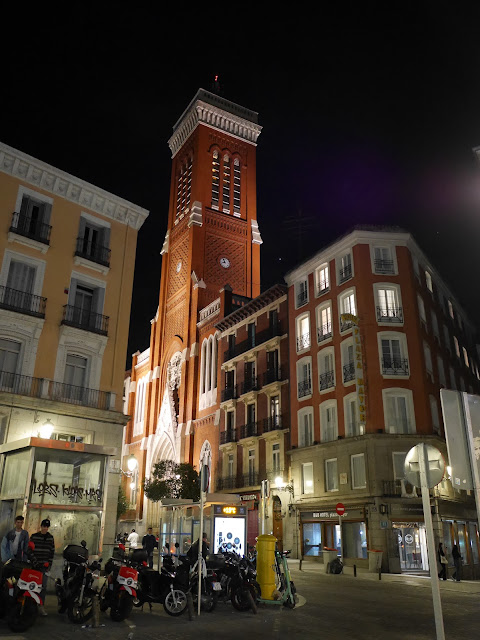Ham and cheese
It's halfway through my trip so I thought I would screw my courage to the sticking place, as Lady Macbeth would say, practice my Spanish and dip my toe into Madrid's gourmet food world. This would involve a visit to a quesaria, a panaderia and a carniceria, all within an 8-iron of my apartamento.
The first stop was Cultivo, a cheese shop on Carerra de San Francisco where I picked up a wedge of Spain's best-known sheep's milk cheese, Manchego, from La Mancha. With that in hand, I wanted to sample something a little more intense, and the proprietess pointed me to a creamy but tangy mini-round from Sierra Sur, a 120-goat farm south of Badajoz. That little southwestern town looks like a good vacation spot, to be honest.
As luck would have it, next door is the small bakery Obrador San Francisco, where I ordered half a loaf of a sweet, nutty trigo (wheat) bread with seeds (con semillas). I think they're sesame seeds, but they could be chia or flax, I guess. Anyway, its crunchy, chewy exterior gives way to a pillowy, open "crumb," as the breadmakers would say. For a baguette, ask for una barra, or simply un baguette. I tend to overthink.
My next stop was the charcuteria Los Andes on Calle de Bordadores. It had hind quarters of pigs hanging from the ceiling, so I knew I was it was the right place. Los Andes is also a wholesaler and auctions off legs of its iberico pigs to local restaurants. The Spanish are loco for ham and are extremely picky and knowledgeable when it comes to talking jamon. I liken Madrid to San Diego. If you're ever in that California city, you'll find that every mom-and-pop corner store has an extensive, almost peerless selection of beer. The same is true of the ham scene in Madrid. Even at the Carrefour Express you can find chorizo, salchichon and morcilla, as well as packet after packet of jamon cocido extra.
The ham here isn't cooked, it's dry-cured by hanging after spending weeks in a barrel of salt to dry it out. The most prized ham in Spain is the iberico variety, from the black-haired Iberian fatties that get half their calories from acorns, and their meat can go for 100 euros a kilo. That clearly isn't happening, so I settle for a higher-end Serrano jamon at $15 a pound.
Today's haul, clockwise: jamon Serrano, trigo con semillas, Manchego and Sierra Sur. It's 5:30 p.m. I'm going to make a sandwich, pick up a can of Mahou cerveza at the corner shop and go watch the kids kick the ball around outside the church.





